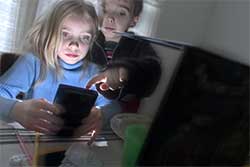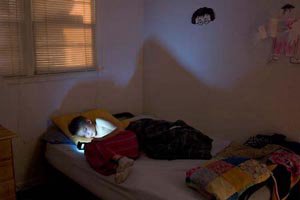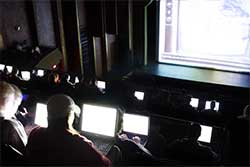 Photo Copyright Dennis Chamberlin
Photo Copyright Dennis ChamberlinViewer as Victim?
Last night we heard many times Oscar recipients talking about the impact that viewing a film on the " big screen" can have. And indeed for this movie maven, films projected on the big screen have always been the greatest escape. But now, with small screens so pervasive, "technology can transport us so far, and so fast," writes Jessica Helfand in her book Essays on Graphic Design, New Media, and Visual Culture. Indeed it is almost " scary to think of the viewer as victim," as the
" precipice between believability and brainwashing grows narrower by the second. "
 Photo Copyright Dennis Chamberlin
Photo Copyright Dennis ChamberlinThe more we grow accustomed--indeed addicted--to the screens around us, whether in the form of television, computer, film, or a combination thereof, the more we imprison our minds and restrict out capacity to exercise thoughtful independent judgment.
Jessica Helfand,
Essays on Graphic Design, New Media, and Visual Culture
In the previous post Smart Mobbers' Endangered Digits I wrote about Smart Mobbers who communicate using text messaging.
Photographer Dennis Chamberlin's " Screen Culture"
Shortly after reading Helfand's essays I stumbled across Dennis Chamberlin's photo essay, " Screen Culture" of people interacting with screens, what he calls their " new reality". I found Chamberlin's work displayed at www.sitewelder.com a web site provider for photographers where we both host our sites. I contacted Chamberlin and requested permission to include a few of his images on this blog. He kindly complied and also included his personal statement.
Dennis is now an assistant professor at the Greenlee School of Journalism and Communication at Iowa State University. A contract photographer with the New York Agency, Black Star from 1989-2005, he worked as a freelance photojournalist based in Poland from 1987-2002. His clients have included National Geographic,
The Economist, Forbes, GEO, Liberation, Newsweek, TIME Magazine, New York Times Magazine,
US News & World Report, PepsiCo. International, Procter&Gamble, and International Paper.
Screen Culture: Photographer's Statement
Over the years we have incorporated technology into to our world to such a degree that we no longer notice the role it plays in our daily lives. Televisions, and in a much broader sense video screens, have a ubiquitous presence in American culture. The technology involved, whether high definition television or portable video games, is purported to increase communication between individuals and allow for greater dissemination of information, but in practice these technologies have isolated us from one another. I have seen this phenomenon while making the images for this project, whether it is with adults lost in the world of a favorite television program or my own children entranced by a blinking object on a computer screen.
Photo Copyright Dennis Chamberlin
My approach toward the project is in the tradition of straight documentary, and the photographs are the result of observing the subjects as they become engaged with the media in front of them. We all spend a part of our day staring at screens, sometimes while at work, or perhaps as a way to relax at the end of the day, and I think that most of us can see ourselves somewhere in these photos.
We tried an experiment for one year in our home: to live without television or video games. After a couple of months of this self-imposed exile from popular culture, we bought a computer with the capability of viewing DVD movies on its 17"” screen. This was sufficient for the first year. After a year our 11 year-old son bought a used Gameboy on the internet. One day, a couple of months later, he sold the first model to his younger siblings and used the money to buy a better Gameboy purchased from a friend who had recently received an even newer model. Then came the used television, received as a gift from a relative. A television without a DVD/VCR combo player isn'’t of much use so that was the next acquisition. Our home is now pretty well outfitted for the moment, but we are still lacking a plasma screen as well as camera phones. We used to talk with one another. Now we stare at screens.
Dennis Chamberlin

No comments:
Post a Comment